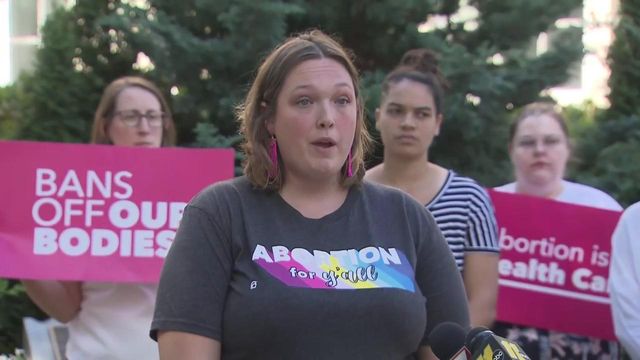Women's lives are on the line with NC federal judge's latest abortion ruling, activists say
North Carolina, which had more liberal abortion laws than many other states in the South, saw those rights reduced on Wednesday when a federal judge ruled that abortions are no longer legal after 20 weeks of pregnancy.
U.S. District Judge William Osteen reinstated a law that banned the procedure after 20 weeks, a law that had been on the books but had gone unenforced because of a legal challenge.
In arguing against the legal limit, abortion providers had cited Roe v. Wade. When that ruling was overturned in June by the Supreme Court, Osteen found that argument no longer held.
Abortion rights activists gathered on Thursday in downtown Raleigh to warn voters that Republicans in North Carolina could further restrict abortion rights should they expand their majority in the midterm elections.
"We know that this isn't where they are going to stop. We have to continue to hold the line with Gov. [Roy] Cooper's veto," said Julian Riley, Planned Parenthood of North Carolina's Director of Public Affairs.
These laws could affect the health of women and other people who give birth across the state, possibly leading to severe complications and even death, according to Maya Heart, the North Carolina coordinator of SisterSong. SisterSong is a national organization focused on helping minorities gain across to abortion.
"Any ban on abortion violates the dignity and vanity of working-class people, those living in rural areas, Black folks, people of color, women, and queer and trans people," she said. "Abortion is essential healthcare that everyone deserves access to."
According to new estimates from the University of Colorado Boulder, abortion bans across the U.S. could increase maternal deaths by 24%. That number is even higher among Black Americans.
The risk of complications while carrying a pregnancy to term is 14 times higher during pregnancy than it is during an abortion, according to Maria Small, an obstetrician and gynecologist and an associate professor in the Department of Obstetrics and Gynecology at Duke, where she is a maternal and fetal medicine specialist.
Activists maintain that the biggest delay in North Carolina law for people seeking an abortion is the 72-hour mandatory waiting period. The General Assembly extended the waiting period in 2015, making North Carolina the fifth state to require counseling three days before an abortion — one of the longest waiting periods in the country.
A 2018 study found that the median time of decision to care was a week. Some people were waiting up to 15 days.
There were more than 25,000 abortions performed in the state in 2020, according to state records. Most people – more than 98% – got the procedure at a clinic or from a provider here.
People in 91 counties in the state don’t have easy access to abortion care, and North Carolinians must undergo state-mandated counseling before getting the procedure.
North Carolina's latest restriction on abortion does nothing to help women gain access to contraceptives or help support women seeking abortions, Riley said.
"People need abortion care later in pregnancy often due to two factors: New medical information and barriers that delay their care," she said.
Riley warned that legislatures in North Carolina and across the South are going to continue pushing back on abortion until the right to abortion in the state is eliminated.
North Carolina has become a refuge for residents of neighboring states with more abortion restrictions, like South Carolina, Georgia and Tennessee, where abortions are now illegal after six weeks.
Before Osteen’s ruling, abortions were legal in North Carolina until fetal viability, which generally falls between 24 and 28 weeks of pregnancy. They were also legal in a medical emergency later in pregnancy.
North Carolina State Senator Natalie Murdock said that now is an important time make sure that people cast their vote for the Democratic party to make sure that Republicans don't take complete control of the state.
Tammy Fitzgerald, executive director of the conservative North Carolina Values Coalition, said her organization was pleased by the ruling Wednesday.
“Limiting abortion to 20 weeks is just the beginning,” she said in a statement, “because unborn babies are humans with human rights, and we are going to work hard to get legislation passed which will protect as many unborn babies and their mothers as possible.”
"Abortion bans do not stop the need to have abortions," Riley said.
Instead, she emphasized, women are going to seek alternative, non-medical ways to have abortions that could lead to severe complications. With the ruling, North Carolinians who need an abortion after 20 weeks would have to travel to Virginia, Washington, D.C., or farther.
However, according to data from the U.S. Centers for Disease Control and Prevention, most women who receive an abortion do so early on in their pregnancy. In 2019, fewer than 1% of abortions nationwide were performed after 20 weeks of gestation, the data says.
"Women don't know what the laws are in their state. Now there's even more confusion," said North Carolina State Representative Julie Von Haefen (D-Wake).
North Carolina’s top lawmakers, Republican Senate leader Phil Berger and House Speaker Tim Moore, have signaled an openness to further restricting abortion access. Democratic Gov. Roy Cooper has consistently vetoed proposals that would limit a woman’s access to the medical procedure.











